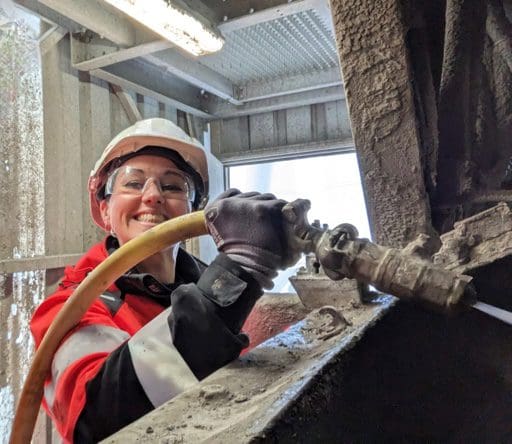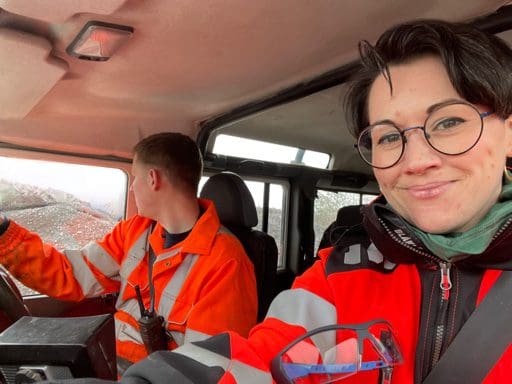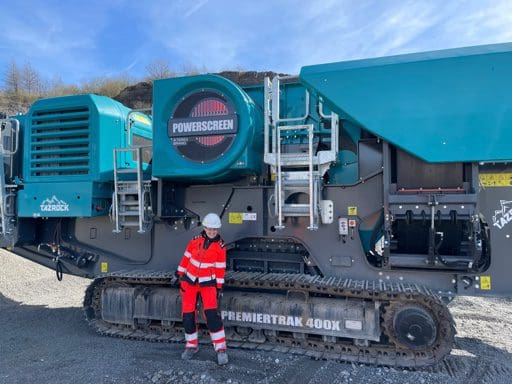Geotechnical Manager inspiring women in Engineering
Katherine Evans is a Mining Geologist and the founder of Bold as Brass, a LinkedIn group for women to support each other. She has worked in various locations in the UK, Canada, North Sea and North Atlantic.
In this article she shares her experience and discusses how to achieve a more inclusive workforce for women in engineering.


Background
What led you to study geology?
My A-Level teacher, Mrs Tanner in Gowerton School near Swansea. She was a fantastic teacher, blew my mind with what the planet did and does.
Were there any childhood interests which were a factor?
I liked natural history, and I spent a lot of time with my maternal grandparents next door who had a small holding. However, nothing could have readied me for what I was about to learn when I was 16. That’s because the natural history you learn as a child in the 1990s isn’t quite the thing you learn about when you hit hard line geology facts. My mind blown and I was hooked on learning more.
Who have been/are your role models?
Just me. I’ve always been an odd ball, a loner, and fiercely independent. So, I’ve just carved my own way and done my own thing.
Geologists
What exactly does a Mining Geologist do?
Mining geology is made up of a few different roles. There’s an exploration factor, you’ve got to find the mineral, test it, and calculate it. Then you need to work out what is the most efficient process of extraction. After that there’s the actual designing of the pit. Next there’s the in-operation guidance, to make sure everything is safe and that the mineral they are extracting is what they were expecting. The mining geologist leans into mining engineering, or it can be a completely different role, where the two people work together closely.
How have your different roles used different parts of your experience and education?
Each role I’ve had has used experience from previous roles, and it’s amazing how little of my education it actually uses. My degree gave me a basal understanding of geological processes, but I’d say absolutely everything I know about mining I’ve learnt from being in it.
Why have you specialised in surface mining?
There aren’t very many underground mines left in the UK. Since we are settled in South Wales with children in the village school, I’m happy not to move. So sunshine mining is where I’ll be staying for the foreseeable unless I ‘squiggle’ in my career and add some new strings to my bow.
Leading and managing
What makes a good team leader/manager? What have you learnt from your time leading, managing and mentoring?
I think there is a big difference between leading and managing.
You lead people and manage things.
I’m a geotechnical manager. So, I manage geotechnics; rocks, quarry faces, stockpile stability, paperwork, consultants, but I have no people to manage.
Leadership to me is about influencing and not ordering. Prestigious leadership far outweighs authoritarian leadership, where relationships are fostered, trust and respect are mutual, and people feel unjudged. Ideas and thoughts are easier to voice when you don’t feel belittled.
I think leadership is about showing the way and letting people choose what is right, not showing who’s boss through power plays. I don’t believe you need to be at the front or constantly in the spotlight to be the leader, you can be a leader from inside a team.


Bold as Brass
You established a LinkedIn group – Bold as Brass. What was the catalyst for establishing the group?
I was full of fire after Covid, having a baby through the middle of it and struggling with post-natal depression.
It felt that:
women and children were forgotten about;
it was as if domestic abuse never happened;
parents were expected to juggle teaching their children with working from home, and;
midwives, health visitors, and perinatal mental health units were stretched beyond human capability.
I felt Covid pushed equality backwards, and I could really see this when I started talking to women from outside my organisation when I returned from maternity leave. I harnessed my fire and formed Bold as Brass, a place where women could come together to support each other in the same way I had been supported by women when I was at my most vulnerable.
Wading against the current, day in day out, is exhausting. When you are the “only” on site it’s hard to know if it’s that company’s systemic discrimination that’s causing you to feel the way you do. It’s hard to know that it’s not just you.
We all have these issues, we all face them alone, but we’re stronger together and acknowledging our intersectional experiences is really important to understanding how we can continue to grow as supportive, open minded, modern thinking workforce.
Main aims of Bold as Brass
What are its main aims? How do you see it growing?
Bold as Brass is a network, a community, a catalyst, and above all a tribe.
We connect women with other women in the mining, construction, engineering, rail, energy, and waste sectors. As well we connect with all of those job roles that support the industry and businesses, like ecologists, archaeologists, tree surgeons, hydrologists, geologists, contaminated land specialists, trainers, HR professionals, finance, administrative staff. In short, anyone who works for a company that uses high viz PPE is welcome.
We have two forums on LinkedIn.
Our women’s safe space that is open to people who identify as a woman.
Our allies group open to anyone at all, heavy industry or not, who wants to learn about the industry through women’s eyes and how to be the best ally.
We have an ever-growing group of wonderfully kind volunteer coaches who gift us their time and expertise to increase courage in our members so they can be bold. We know how important it is that industry culture changes around women; women are not the problem, but we also know how important it is for our members to feel powerful.
Our women’s group is a place where women can:
network with other women for career progression,
reach out in search of a mentor,
drop an “open to work” post,
or ask for assistance in anything at all.
PPE
You have been championing PPE through Bold as Brass, can you explain more?
Our ongoing battle is with inclusive PPE, especially women’s fit PPE.
I am a huge advocate of networking. I’m at my best one to one, and it’s here that I’ve managed to forge some brilliant relationships with individuals in the PPE industry. I think so many people are ready to ‘chuck the PPE industry under the bus’, but it’s the suppliers and then company purchasers who prevent the inclusive and women’s PPE reaching the individuals who need it.
I don’t think enough purchasers realise that PPE isn’t just a uniform, it’s safety equipment.
Examples
Trousers – If a woman can’t move properly in her trousers, how can she quickly move out of the way of something if required, or how can she perform a manual handling task?
Gloves – If her gloves don’t stay on because they are four sizes too big, how can she tighten a bolt or dial numbers on a pad?
Boots – If her boots are sliding around her feet and don’t tie around the ankle because they are made for male foot widths, is she expected to wear two pairs of winter socks in summer? Is she expected as well to devote her attention to the additional trip hazard she now has tied to her legs?
Put all of this together with:
a hard hat that doesn’t sit on her small head or sit properly over her afro hair;
a jacket she’s had to size up to fit over her chest but now the sleeves have to be rolled up over the high viz band.
Now you are looking at a person who is neither protected nor safe to be on site.
Even though that saves money, it can’t be right. Is there honestly any wonder why women aren’t making it to the top positions.
Women in the mining industry
The mining industry is changing but remains predominantly male. What do you think will change over the next ten years?
Honestly, if virtue signalling doesn’t stop and allies don’t start stepping up instead of looking on, very little. Sexism is still a massive problem in the mining industry. “The Industry” isn’t a being, it’s composed of organisations made up of people. There are still too many sexist people, making it into positions of power and influence, and far too little being done within organisations about its institutionalised and systemic sexism. It’s not enough to have silent allies, we need people who are advocates to stand up and speak out against what is wrong.
What about the industry being more diverse overall? How can that happen?
There are very few women in leadership positions within the mining industry. So those with the power to make a meaningful change within the industry need to first recognise that there is a problem. When an overrepresented group is also the group with the power, and that group does not recognise that there is a problem, then it is difficult to see how a change will happen. I certainly don’t agree with it, but I’ve seen it since my first days of work. If the mining industry is serious about change and wants to attract modern thinking talent to its organisations, then this group of people need to be proactive and lead the change. We cannot and should not leave it up to the people in the underrepresented group to create a change of culture.


Encouraging women into the mining industry
How can more women be encouraged into the mining industry?
By making our workplaces somewhere women feel like they want to be, would be a good start.
Workplaces that feel safe and are safe, where sexism and discrimination isn’t brushed under the carpet or passed off as “just a joke”, are what we need to aim for.
Clear procedures in place for all employees and line managers, to deal with bullying, harassment, and discrimination.
Workplaces that accept women and men as different, giving the women and men the equity, they need to survive and succeed in that workplace.
Examples
For example, period friendly toilets on all sites, that aren’t locked, and contain period products free of charge, just like toilet paper.
Access to career coaches and mentors.
Flexible working arrangements for everyone, not just mothers.
Decent paternity and parental leave policies, to show that the company is clear on what it takes for us to reach equality, and that isn’t typecasting the mother as just carer, father as just bread winner.
The ability to take secondments and sabbaticals to let employees be in control of their own career at different points in their life, be it early, mid, or late. To allow them to flex in their personal lives for their health or family or take sideways moves so they can add strings to their bow.
Diverse teams
What do you consider to be the value of diverse teams and how does this benefit the mining industry in particular?
Diversity breeds innovation.
If you’ve ever read Rebel Ideas: The Power of Diverse Thinking by Matthew Syed, you’ll understand this. We are all made of experiences that make us unique. Although many of us will have similar experiences depending on our circumstances growing up, the education we received, the industry we worked or work in, plus those which we experience due to our protected characteristics.
If we keep filling job vacancies with people who have had similar experiences to those around them, we will keep coming up with the same answers. When we throw some people who are wildcards into the group, things start to happen. That’s where the magic happens, and that’s where the innovative thinking starts to occur. ‘Brain soup’ allows all of these experiences to come together, and new ideas drop out of the end. Then suddenly we’re away from the “get what you always got” analogy.


Responses